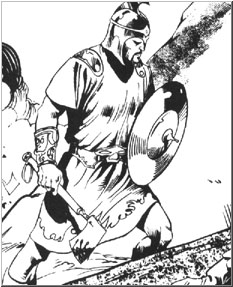
Corinthian


A land of mountains and non-descript city states held together in a loose alliance, Corinthia's main claim to fame is that the Road of Kings passes through its central country-side. The western reaches contain rank after rank of forested ridges, extending to the jagged wall of the Karpash Mountains.
Corinthia apparently had a separate identity as early as the florescence of Acheron. It was subject to the latter, then "gained its independence" with the fall of the ancient empire to the Hyborians. Some time during the 3,000 years that followed, it came under the growing hegemony of the Hyborians. The economy of Corinthia is both pastoral and agricultural, with specialized small industries in the city-states, including the production of wool and hand crafted musical instruments.
The Corinthians are dark-skinned as Hyborians go, due to intermixing with the Zamorans. They still retain the Hyborian stout build and tawny hair.
The city-states of Corinthia have a variety of governmental styles, all based on republican theory. Government leaders are called Senators, and their power varies with the extent of their financial holdings. The Senate not only creates the laws, but also manages the courts and the prosecution of criminals. The Senators commonly use their legal powers to intimidate their opponents, and each city-state in Corinthia has its own "whips," senior Senators who rule the city.
The Corinthians are Mitra worshippers, with only a scattering of the pantheons of Shem and Turan. There is little religious innovation, as most theological developments come from Nemedia or Aquilonia, but in some city-states the temples are a major political force.
